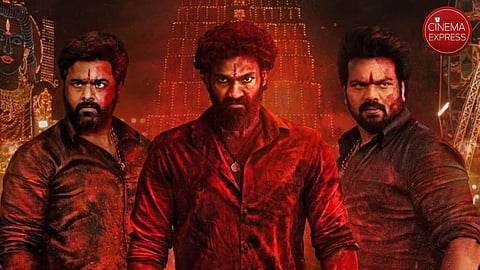Bhairavam Movie Review: A jaded action-drama that trades layers for the 'larger-than-life'
Bhairavam(2 / 5)
Some time in the second half, the protagonist of Bhairavam finds himself in a dilemma trying to mediate a conversation between two men, who were once friends, but can’t see eye to eye anymore. We are expected to be as nervous as our protagonist — but how can we, after the makers have just dazzled us with a colorful massy dance number a few minutes ago? This decision puzzles you for a while, before you realise the makers of Bhairavam are bound by a template which they cannot think outside of. Formula is not necessarily a bad thing, but at what point do filmmakers realise it cannot come at the cost of structural or tonal integrity?
Director: Vijay Kanakamedala
Cast: Bellamkonda Sai Sreenivas, Nara Rohith, Manchu Manoj, Ajay, Divya Pillai, Aditi Shankar, Anandhi
Directed by Vijay Kanakamedala, Bhairavam is an official remake of the 2024 Tamil film Garudan. The story revolves three men - Gajapathi, Varadha and Seenu — who differ in their social status but remain tightly knit in their friendship and loyalty towards each other. Seenu (Bellamkonda Sai Sreenivas), in particular, is a character who is both empowered and chained down by his loyalty to these two men. However, circumstances soon mould in a way which brings out the darker side of one of them, and puts their relationship to test.
Bhairavam's story is brimming with moral complexities and grey shades. However, due to bland direction and simplistic performances, the impact is lost. Varadha, played by Nara Rohith, comes off as too much of a Mr Goody-two-shoes. Similarly, it’s hard to see Gajapathi (Manchu Manoj) as anything else than an antagonist after a point. Vijay Kanakamedala takes a layered script like Garudan and turns into a binary narrative — in other words, like a formulaic Telugu movie. Seenu, played by Bellamkonda Sai Sreenivas, is quite an interesting protagonist. Even though he is introduced to us in a quintessential saviour mode (protecting a young girl in slo-mo shots), he is also shown as equal parts goofy and poignant. Seenu might be a macho-looking man, but is also somewhat slow-witted when it comes to matters of love — Instead of wooing his beloved, Seenu finds himself being the bashful recipient of affection from a young spunky girl named Vennela (Aditi Shankar). During the intro song, Seenu introduces himself as the Hanuman to the Ram and Laxman he sees in Varadha and Gajapathi. There is plenty of unexpected humour to Seenu’s loyalty as well, aptly captured in moments where he often breaks into breathless vents whenever asked about 'the truth.'
Having said that, the colorful strokes to Seenu’s character are buried in a screenplay laden by contrivances and forced melodrama. While there are some sporadic acting moments that impress, the lead cast largely (Manchu Manoj, in particular) mistakes grunting voices for dramatic performances. Resultantly, a lot of Bhairavam is narrated to us in heavy, booming voices where sometimes it actually becomes difficult to fathom what’s being said. It’s a pity to see actors like Jayasudha and Anandhi wasted in petty roles.
What eventually stays with us are the visually striking transient moments — the way a foggy blue night sky looks, when foregrounded by an ember-hued backdrop of a brick kiln, in Gajapathi’s introduction sequence. The way the director creates space for a quiet, serene stanza in the celebration song early on.
There is something to be said about how, for most Telugu filmmakers, the idea of making a story more ‘accessible’ simply equates to adding song-and-dance sequences and making action scenes larger than life. The screenplay is stripped away of its emotional depth and moral ambiguity, even though the story is clearly penned with inspiration from Mahabharatha. But the biggest weakness of a film like Bhairavam is that it does not have the courage to stage a bona fide underdog protagonist. Bellamkonda Sai Sreenivas tries his best to bring groundedness to Seenu, but cannot rise above his own limitations — his performance remains perennially inclined towards the heroic, despite essaying a character that’s clearly meant to be subservient to the two powerful men he is loyal to.
In a way, this inability to create a believable concoction of starry presence and earthy characterisation is emblematic of everything that’s wrong with Bhairavam — it wants to tell a layered story, but it also cannot help but resort to simplistic cliches.

